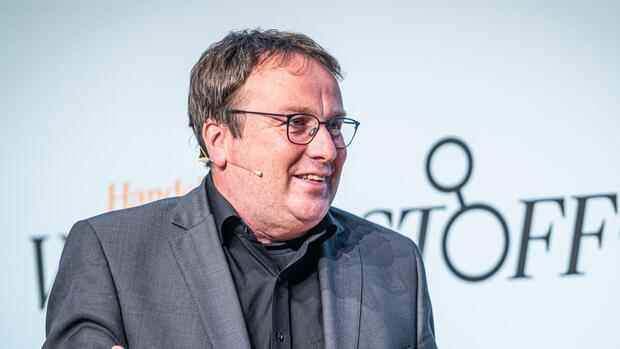On planning to dismantle the gas network: “The fact that this has met with so much critical resonance shows that we are obviously facing a problem.”
(Photo: Photo Vogt)
meal Thought games from the Federal Ministry of Economics on the dismantling of the German gas network have recently caused massive criticism from the network operators. At the Handelsblatt Hydrogen Summit in Essen, Oliver Krischer, State Secretary in the Ministry of Economics, reacted to the headwind from the industry. “The fact that this is met with so much critical resonance shows that we are obviously facing a problem,” said Krischer.
One must discuss which parts of today’s natural gas network can continue to be used and integrated into the existing hydrogen infrastructure. But Krischer also warned against the idea that the gas network could be transformed into a hydrogen network at the push of a button, “and then the world with hydrogen will be just like we have it with natural gas now”. Rather, municipal utilities and network operators would have to pay close attention to how they make their investment decisions.
At the core is the conflict about the heating of the future: should hydrogen be used for heating in the old gas networks in the future – or with electric heat pumps? The Federal Ministry of Economics prefers the second option – for which only a much smaller gas network would be needed than is in operation today.
Krischer’s colleague as State Secretary in the Ministry of Economics, Patrick Graichen, had therefore suggested to the local energy suppliers in mid-May that they start planning for the dismantling of the gas networks. Because in 2045 “of course (…) there will be no more gas in the networks,” said Graichen at the Handelsblatt conference Stadtwerke 2022. Supplying heating systems in private households with green hydrogen through gas networks is a “dream”.
Top jobs of the day
Find the best jobs now and
be notified by email.
A few days later, representatives of municipal companies criticized Graichen’s statements in the “Welt am Sonntag”. The head of the industry association of the German gas and water industry, Gerald Linke, accused the state secretary of being “driven by ideology”. The Ministry of Economic Affairs is trying to “push heat pumps onto the market with all its might”, for heating customers it will “only be expensive, very expensive”.
Outraged reaction of the public utilities
Ingbert Liebing, who represents more than 900 municipal utilities as general manager of the Association of Municipal Enterprises (VKU), criticized Graichen’s plans as “not productive”. The gas network infrastructure is worth hundreds of billions of euros and could also “play an important role” in climate-neutral energy supply, for example by supplying green hydrogen. “First of all, a feasible perspective” is needed for millions of households.
The CTO of the transmission system operator Open Grid Europe, Thomas Hüwener, joined the criticism at the Handelsblatt Hydrogen Summit: The statements from the Federal Ministry of Economics came “at most at the wrong time”. It’s about offering solutions and not dogmatically pushing for purely electrical solutions. For a gas network operator who is already planning to dismantle his network, the profitability of the current operation is also in question. Everyone involved should now have a quiet debate about the future of the gas network.
In fact, there are problems with both solutions: Experts doubt that heating across the board can be economically operated with hydrogen. At the same time, heat pumps are not yet suitable for being used as the only heating system in all households in the near future.
Vonovia boss Rolf Buch criticizes heat pump bureaucracy
Economic State Secretary Krischer nevertheless advocates heat pumps again at the hydrogen summit. For example, in the Eifel and in single-family home areas on the outskirts, heat pumps must be used. It will “not be the technology of choice to supply the house with hydrogen heating in the future”.
The Vice President of the Federal Network Agency (BNetzA), Barbie Haller, tried to mediate with the network operators. They would have to be involved at an early stage and know “that they will be viable and able to collect income until the end of the use of the gas infrastructure”. The BNetzA is currently still in crisis mode. The question of what will happen to the distribution grids or the transmission grids in the long term will be “very high on the agenda” from 2023.
The Vonovia boss at the Handelsblatt hydrogen summit.
(Photo: Photo Vogt)
Vonovia CEO Rolf Buch also reported on completely different problems with heat pumps in practice: the housing group installed numerous heat pumps last year and submitted corresponding applications. But “90 percent of the heat pumps applied for last year have not yet been approved”. The systems are therefore ready for use in the houses, “but we continue to burn Putin’s gas,” criticized Buch.
Half of the heat pump applications had not been contacted by Vonovia after six months. This is not due to bad will, but is a question of capacity. However, Buch warned that the slow approval procedures for heat pumps could become a “huge problem” for climate protection.
More: “Ramping up of the hydrogen economy”: Politicians and CEOs predict a completely new industry

